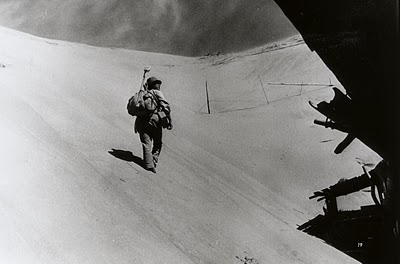A faithful telling of Kobo Abe’s novel about a Tokyo teacher and bug collector who is kidnapped by an entire village while vacationing in the desert, this Sisyphean drama by Hiroshi Teshigahara is the best kind of parable, one marked by nuance, ambivalence and immense strangeness.
An entomologist who is about to be squashed, Niki Jumpei (Eiji Okada) sojourns to the desert to try to locate a rare type of tiger beetle, hoping his accomplishment will get his name listed in a field guide. A world-weary soul who is worn by city life, the educator is only too happy to accept a stranger’s offer to lodge him with a local. As several villagers lower him into a sand pit with a rope ladder, Jumpei has no idea that he is descending into an arranged marriage with the woman (Kyôko Kishida) who inhabits the hut.
 The woman must spend hours every day digging her house out from under sand drifts or it will collapse and a chain reaction will claim every home in the very interdependent village. She needs help with the chore since her husband recently died, so the neighbors decided to “trap” her a new husband. Soon realizing that the rope ladder will not be making a return appearance but unwilling to accept his fate, Jumpei hatches a succession of plots aimed at escaping from the pit. As each hope dries up, he increasingly unleashes his frustrations on the woman. But as the months progress, he begins to wonder whether the hopelessness of his new life is better than the frustration of his old one.
The woman must spend hours every day digging her house out from under sand drifts or it will collapse and a chain reaction will claim every home in the very interdependent village. She needs help with the chore since her husband recently died, so the neighbors decided to “trap” her a new husband. Soon realizing that the rope ladder will not be making a return appearance but unwilling to accept his fate, Jumpei hatches a succession of plots aimed at escaping from the pit. As each hope dries up, he increasingly unleashes his frustrations on the woman. But as the months progress, he begins to wonder whether the hopelessness of his new life is better than the frustration of his old one.
Of course, Jumpei doesn’t really have much of a choice in the matter. He will be made to sacrifice self for the greater good, to conform to the collective will to help ensure the survival of the community, to become one more fungible grain on the desert floor. He will all but disappear into the swarm. “If it wanted to,” the displaced man says with alarm, “the sand could swallow up cities…even entire countries.” It does all the time.•

